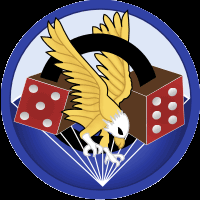
Herbert "Herb" Suerth Jr.

Herbert "Herb" Suerth Jr.
|
|
|
It's with great sadness that I must inform you of the death of Herb Suerth. He passed away on October 14, 2017. We should never forget that this man has done for us; Rest in Peace Herb thank you so much for our freedom. God Bless you! |
Many thank you to Herb Suerth for giving me a few hours and advised some website to complete my notes.
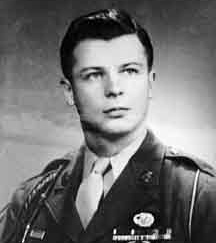 <= Herbert Suerth - 1945
<= Herbert Suerth - 1945
Herb Suerth - 2011 =>
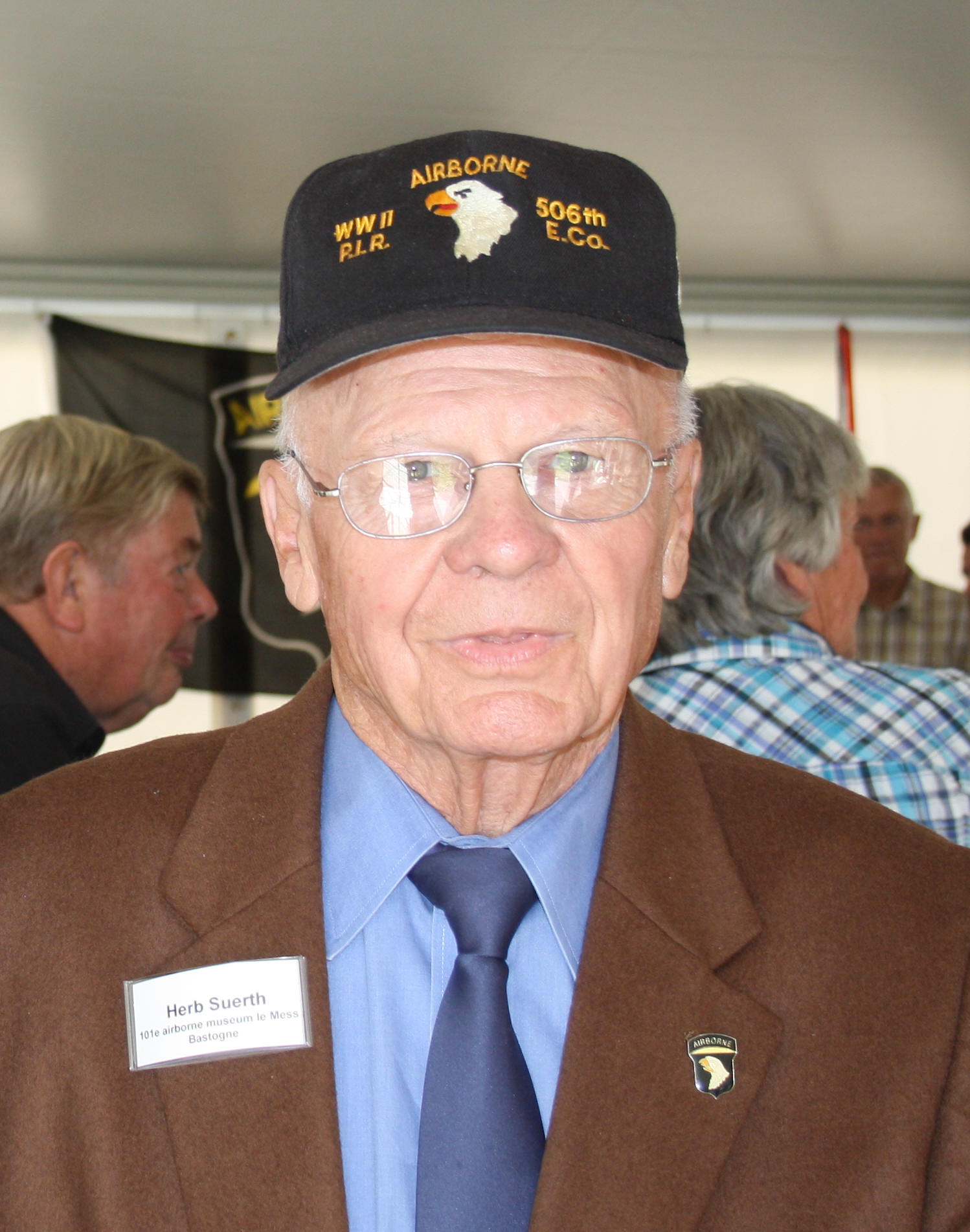
Herbert J Suerth Jr was born in October 28, 1924 in Chicago, Illinois. Herb was the only son of Herbert Sr and Lillian Suerth. His dad was a veteran of the World War 1. He made lifts.
In June 1942, he graduating from De Paul Academy, he was 17 years old. Then, he began at Marquette University as a mechanical engineering. But the war caught up with him, at age 18 years old, Herb Suerth reached the age to be engaged. Herb Suerth quit school and decided to enlist.
"If you enlisted, you got your choice of what branch of the service you wanted to be in."
On Dec. 8, 1942, he joined the U.S. Army and the Engineers Corps. He was sent to Fort Belvoir, Virginia, for basic training as a combat engineer.
"I didn't like it at all, but of course you weren't going to get out of it just by saying you didn't like it."
What Suerth disliked the most was training in deactivating land mines.
"I don't know how they ever got guys to do that job."
Fortunately, Herb Suerth got a break, although a temporary one, when the Army put him in the ASTP program and sent him to college at the University of Pennsylvania. The respite didn't last that long, though, when the ASTP program folded.
Herb Suerth first went back to basic training, and then did several months in New York City, training in electrical engineering.
"We lived down by the Bowery. I think it was the Broadway Central Hotel, and it was run by a madam. The first two floors were working girls, but the security was so tight that I never even saw them."
The next big move was overseas on the Queen Mary, and he landed in July of 1944, just after D-Day, in Scotland.
"We got to ride the train the full length of Scotland and England, and it was just gorgeous. We had those long, summer days."
Herb Suerth ended up in a replacement depot with about 1,000 other engineers, some of whom were anything but eager to get into the fighting.
"A lot of the guys were older, with families. They had been electricians before the war. They used to sit around and talk about how they would avoid combat by shooting off their toe or sticking Fels Naptha under their armpit."
Herb Suerth, on the other hand, was ready to go. When he and his buddy Chase saw a posting that they were taking applications for the airborne divisions, they immediately went to their company commander.
"He told us that we couldn't do that. He told us we were in the service forces and we couldn't volunteer for the airborne. He said we couldn't switch, and so we were dead in the water."
The following Monday morning, though, all the replacement engineers were mustered for an announcement. The colonel told them all the replacements they were all infantry replacements.
It turned out the Army had a greater need for people toting rifles than people toting slide rules. For Herb and his friend this was the ticket to assign to the Airborne. Chase ended up in the 82nd and Herb in the 101st.
"I went to jump school at Chilton Foliat. And we got to wear jump boots, but we couldn't blouse our trousers. You never want to do that before you get your wings."
The commanding officer at Chilton Foliat was Captain Sobel, who was made famous in the Band of Brothers book and television series at a martinet who was hated by his troops.
"But I only saw the guy once, and he made no impression on me."
The sergeants who ran the jump school, though, did make an impression on Herb Suerth.
"I think they picked sergeants because they couldn't be court martialed. To get those jobs, I think they had to have something in their service record that listed them as 'diabolical.' They did everything they could to make you quit."
Herb remembers one Major who did a bad roll in jumping off the 15 foot tower and ended up with a mouthful of sawdust. He spit the sawdust out, an act the sergeant in charge didn't like.
"He made the officer run around the field with his arms outstretched yelling, 'I am a bad major, I spit in the sawdust.'"
On some training days, the volunteers were forced to do as many as 500 pushups in an eight hour period.
"Sometimes when you were doing pushups, the sergeants would get down beside you and do one-armed pushups while you were doing two-armed. They'd be about six inches from your face yelling, 'You want to quit? You want to quit? Give up now and you can be out of here by lunchtime.' And some guys did that."
Herb Suerth stuck it out and made it through his first practice jump.
"It was the first time I was ever in an airplane."
The rest of the 101st, which was stationed nearby, went to Holland in August, 1944, as part of Operation Market Garden before Suerth got his third jump in. In the end, he did his five jumps and got his wings, and he did a couple more just for the experience.
Right around Thanksgiving, Herb was sent to France to join Easy Company of the
506th Parachute Regiment of the 101st Airborne. The division was licking its
wounds and resting at Camp Mourmelon near Reims after the tough fighting in
Holland.
Replacements were generally not treated well by the veterans, these guys had
been living in death and destruction and lost some buddies in the last 102 days.
They were not ready to welcome new people into their outfit. These men all
trained together since early 1942, and they were not really ready to begin to
take other people into their group but Suerth said he had no problems.
"I don't remember any of that negative stuff at all. I think I was smart enough to keep a low profile."
Herb Suerth had reported to his platoon leader, Lt. Ed Shames, and he announced himself with his complete name, including the "junior" at the end. Shames immediately tagged Herb Suerth as "Junior" and the nickname stuck throughout his brief stint with Easy Company and through all the reunions since.
“Everybody had nicknames like OneLung McClung, NoShoulders Mellet, Popeye Wynn.
The nicknames were important when we crawled in the dark and asked: “who is
that”. We used our nicknames so we were sure there were no Germans.”
Herb Suerth said the 101st needed recuperation after Holland.
"They told me it was rainy, drizzly or sleeting most of the time. And then at the end, it turned into trench warfare, and airborne units are not outfitted for trench warfare. They had been sent over in summer uniforms and that's all they had."
Herb Suerth recalls that one day at Mourmelon, soon after the 506th had returned from Holland, a general inspection was called. The men were not happy about it, and one of the unhappiest was McClung, known to his comrades as one of the best soldiers and perhaps the best shot in Easy Company. But McClung was not a spit and polish guy.
"One by one, the guys would come and say, 'Hey Mac, give me your boots.' And another guy would say, 'Hey Mac, give me your blouse.' And other guy would take his ODs. In the end, they got One Lung ready for inspection. It wasn't that they just wanted to help him, it was because they knew that if he got gigged, the whole company got gigged."
Easy Company took it easy during the first weeks of December. Suerth even put in for a pass to Reims on Christmas Eve so he could go to the cathedral there for services. It never happened.
"I remember on Sunday, December 17, Sgt Buck Taylor came in and said, 'We're going up.' There was complete silence in that room."
Most of the men were simply not prepared to go back into combat. There was no ammo dump at Mourmelon, and the men only had what ammunition they had brought back from Holland.
"A lot of the guys had no winter gear, no rifles, no machine guns. I was lucky.
I had my jump boots, my overcoat, my galoshes and all of my equipment. I had
done some training in the Blue Ridge Mountains the year before and so I had a
little idea of how to live outside. I brought all kinds of socks.
"I even had needle and thread because I knew in cold weather the gloves stuck to
the rifles and ripped. It was just little things like that."
Herb, and some others, spent the night sewing extra blankets to their sleeping bag to increase their warmth.
“I knew that those army sleeping bags were no good for sleeping in when it gets
below 10-15 below zero. So I started to wind it with extra blankets and the guys
said to me: “Junior what are you doing.” I explained them why I did that and
told them what I knew about the weather in France and most of them started
winding blankets around their sleeping bags as well. That moment was a mark for
me. I gained a lot of respect from the guys and they started to know me as a guy
who was thinking ahead.”
He even had a new rifle, but he had never fired it.
The men were loaded into large grain trucks.
"There was a platoon in each truck. There were no seats, but it didn't matter because we were too crowded to sit down anyway. We were just a bunch of sardines in a can. The top of the walls of the truck just came up to our helmets, so you could stand on your tip toes and look out."
The company spent 18 hours in the trucks, heading for a destination unknown.
"The weather was terrible, but we stopped often enough to get a little exercise. In the truck, we could stay warm because there was plenty of body heat. We could hear planes all through the night and we knew they weren't ours."
On the morning of the 18th, the trucks stopped just short of Bastogne, a small city in Belgium where most of the highways in the area came together. The men could hear small arms fire not far away.
The first thing the airborne troops encountered, though, were not Germans but Americans. As the 506th marched up the outside of the road, the troops who had taken the brunt of the German onslaught staggered down the middle.
"I saw an American army in retreat. It reminded me of the pictures of Washington at Valley Forge. They had bandages around their heads, no overcoats, no weapons. They were running away, but nobody even thought to stop them. They probably would have been useless anyway."
Herb had a couple of bandoliers of rifle ammunition and grenades strapped to his
uniform, but he still had his unfired weapon. The next day, his sergeant set up
an electrical wire reel as a target and let Herb zero in his M-1.
The platoon marched through Bastogne and headed up the road toward Foy. The
Germans were coming in the opposite direction down the same highway.
The first night was spent in farm country, and the men burrowed into a haystack with just their heads sticking out to stay warm.
"3 o’clock in the morning a shell came over the top of the haystack. Everybody got out of the haystack and suddenly one of the guys went running by. It was Skinny Sisk. Skinny ran by us, he ran by for the second time and when he ran by for the third time somebody asked him “My god Skinny what are you doing.” “Getting to the other side of the haystack”. It appeared that he was sleepwalking. Most of the guys were not physically and mentally recovered.”
The next day E-Company headed to Foy.
“The company was not at full strength; instead of 130 men we had about 105 so we had to spread our lines. We dug our own holes. I dug together with Frank Soboleski. I dug the hole while Frank cut down trees to put over the top. I think he was the only one in the platoon who had a hatchet with him."
Herb Suerth and Frank Sobeleski were on the extreme flank of the company's position, near a machine gun emplacement.
"We were the last hole on the left. There was nothing between us and Bastogne. But then there was nothing between any of the foxholes and Bastogne. There were no reserves."
The snow was cumulating to 20 ft. They finally found a bunch of gunnysacks that were used together with pine needles to keep their feet dry and warm.
“I put my wet socks in my helmet and my combat jacket so the body heat could dry my socks. By doing this I could change my socks a couple of times a day and that kept my feet dry.”
The German shelling was fairly constant.
"You'd go to sleep for a couple of hours, and there would be a bunch of new trees knocked down around you. They would send these screaming mimies at us, they were rockets. They didn't do much damage, but it was psychological warfare."
An attack came on Christmas Eve.
"They came in white camouflage outfits, and you could see that white against the dark trees. It was a bad idea. It wasn't a major attack, but it got our attention."
Most of the fighting was on the other side from where Herb was dug in. When it was over, he surveyed the battle scene.
"There was blood all over the snow. There were 28 of them dead. We had one casualty. Walter Gordon got a bullet through the neck. "When we looked at the bodies, they were all kids, 16-17 years old. Of course, we were only 20 ourselves."
The Germans were pumping most of their heavy artillery into Bastogne.
"Compton and Carwood Lipton brought Gordon to the hospital. When they came back they said it was safer up here than it was in the hospital."
At one point, a German tank was coming down the road toward Easy Company.
"There wasn't much we could do, we didn't even have a bazooka. But an American .75 shell hit this tank dead on. The shell just bounced off."
It did cause the tank to retreat.
After the encounter with the white-clad enemy, Lt. Shames sent Herb out to bury one of the German dead who was lying out in no-man's land.
"I never asked him why he sent me to do that."
Herb battled with the frozen ground for a couple of hours, and was finally relieved by another GI who finished the grave.
"I was a little skittish about it, and I never went through his pockets or anything like most of the guys did. But I did open up where he had his food. He had some pork roast, and black bread with jelly. It was probably his Christmas dinner. I took it back to my foxhole and ate it. It was the first food I'd had except K-rations in over a week."
In the second week of January, Easy Company left its foxholes and advanced to the east to where a German position had been abandoned.
"We spent the night in a German hole. We didn't have any sleeping bags with us, and it was the coldest night of the whole battle. The reason we didn’t have sleeping bags was because the truck that was supposed to bring up our equipment drove on 3 anti tank mines and blew up completely. The explosion was so heavy that there was a helmet of one of the drivers in the top of the tree with his head still in it. We just piled four into a hole, two on top and two on the bottom. Every couple of hours we'd shift places, and the guys on the bottom would go on top and be the blankets."
After the one-night foray, the men returned to their old positions.
"There was incessant shelling. They knew exactly where we were."
“Circumstances got worse, ammunition was low, food was low, supplies of all kind were low and of course gasoline, what didn’t make much of a difference because there wasn’t much to go to while we were surrounded in a perimeter of 2 miles across with an estimate of 10 German divisions around us. If the Germans had come up to us, we never would have been able to hold the line, but they never did so.”
Just before Christmas the weather improved just enough for C-47’s to drop supplies.
“We took what we could get and kept it very close to us so nobody could take it away. Later a number of P47’s came over, they were supposed to be American. They were but they started to drop 500 pound bombs on us. After the 3rd one we started to fire back and I think finally somebody got the message that there were friendly troops on the ground so the bombing stopped. Later on I went to a small stream to get some water and the first thing I saw was a GI helmet with a big hole of a 50 caliber round of a P47. The next thing I saw was the guy’s brain spread all over the rocks were I was supposed to go and get some water. So it was friendly fire that got him. As you can understand I didn’t drink much that day.”
On Christmas, the Third Army broke through the siege and opened up Bastogne. For
the first time since they had left Mourmelon, the men of Easy Company got hot
food.
But the battle was far from over. On January 3rd, two men lost their legs in the
shelling. Later, the company left the Bois Jacques woods and went to a new
position outside a little hamlet. The night of January 9th, 1945, is rememberred
by many of E-Company as a night in hell. Hell broke loose.
"It was a terrible tactical mistake. We took over some old Kraut fox holes, and they had them zeroed in. One shell was a direct hit on one hole and two guys were killed."
Herb was a company runner, and he was sent to the nearest collecting station to get stretchers for the two.
“Lt. Shames sent me out to get ambulances, stretchers and jeeps.”
“I was at the collecting station waiting to give directions to the jeeps and there was a lot of artillery fire; not aimed at us but at the woods. Suddenly one of the men of a tank outfit lighted a cigarette out in the open and within a second there was incoming artillery. I jumped into a hole on top of a couple of wounded men who started to scream. Foolish enough I got out of the hole again and an artillery round landed next to me.”
"It just blew me up in the air, and I landed in the snow. Everyone else was
killed."
"I tried to raise my legs, and I couldn't. It turned out that a shell fragment
had passed through both my legs and had gone right through the femur in both my
thighs. A medic came over and gave me morphine. I thought both my legs were
gone.
"The funny thing was that I never lost consciousness through the whole thing. I
remember the medic going around to each of the bodies. He said, 'This one's
dead. This one's dead. This one's dead.'"
Apparently assuming that Herb was too badly injured to survive, the medics never even applied tourniquets.
"They thought I was dead and it was just a matter of time."
Somehow, though, the shell fragment had missed the femoral artery, and when Herb didn't die, the medics finally picked him up and the put him across a Jeep.
"They didn't tie my legs down, and we were going through a plowed field and my legs were bouncing up and down. I was screaming so much, that I finally told them to hit me in the head to knock me out so the Krauts wouldn't take a sound shot at us. But they just kept driving."
The Jeep brought him to an aid station at a Belgian farmhouse. Herb was laid on a kitchen table, and the doctor came to examine him.
"He took some medical scissors and tied some gauze around them and poked them into one side of my leg. Up to that point, I must have been in shock, because I couldn't feel the pain. He pushed the scissors into the right side of my leg, and they came out the other. I said, 'Oh, that hurts.' And he said, 'Oh, I wouldn't doubt that.”
He was next taken to a field hospital in a convent. It was noon of the following day.
"I remember hearing a saw at the next table, and they took a guy's arm off. I
knew they always left the amputations until last, because they assumed you
weren't going to die.
"They got me on the table and the doctor was scrubbed up and was ready to go. A
corporal was about to give me some anesthetic. I said to the doctor, 'Are you
going to take my legs off?' He said, 'No.' I said, 'Are you bullshitting me?' He
said, 'No, I'm not.' I said, 'Okay.'"
Herb woke up with a body cast from his rib cage all the way down. It was only about 50 degrees in the room and the wet plaster was cold. Still, Herb asked the nurse to take the blanket off his feet.
"I looked down, and I could see ten toes. That's all I needed to see. I fell asleep and slept for 24 hours."
When he was able, he quickly wrote a V-mail to his mother telling her what had happened. He had never quite got around to telling his parents that he was in the airborne.
"Luckily the V-mail got home before the telegram from the government. The telegram just said I was missing in action."
Herb never put a foot on the ground for the next nine months. He had to go through skeletal traction to allow the bones to mend together and not be pulled out of place by the body's muscles.
"I told people later that if they ever wanted to torture anyone, they should put them through traction. It's like red, hot wires in your legs."
He also found out another little trick of the medical trade.
"I looked down one time when they were dressing the wound and I saw these bugs crawling out of the wound. I yelled for the nurse. It turns out that they put maggots under the cast to eat away the dead flesh. It keeps any infection from starting."
Herb had come over on the Queen Mary, and he went home on the Queen Elizabeth, another luxury liner converted to a troop ship. He arrived in New York City on April 13, 1945, the day that President Roosevelt died.
He was taken to Schick Hospital in Clinton, Iowa. He later convalesced at a hospital in Daytona Beach, Florida. After his nine months being bedridden, he was able to begin rehabilitation and spent an additional nine months learning to walk again.
Herb was discharged and returned home to Chicago in May 1946. He soon resumed his education at Marquette where he earned a degree in engineering. He met a nursing student named Monna there, and they were married in 1950.
The two had nine children and 15 grandchildren.
Herb worked for number of companies through the years including Westinghouse and
General Electric. He was in sales and marketing where he could use his
engineering background to good effect.
Eventually he ended up in Minnesota where he was director of Marketing and vice
president for Lief Brothers, retiring in 1990. The family lived on Lake
Minnetonka for years, and now the Suerths live near the lake in Wayzata.
Herb has been active in the Easy Company reunions, and is now president of the Men of Easy Company made up of the survivors of the company.
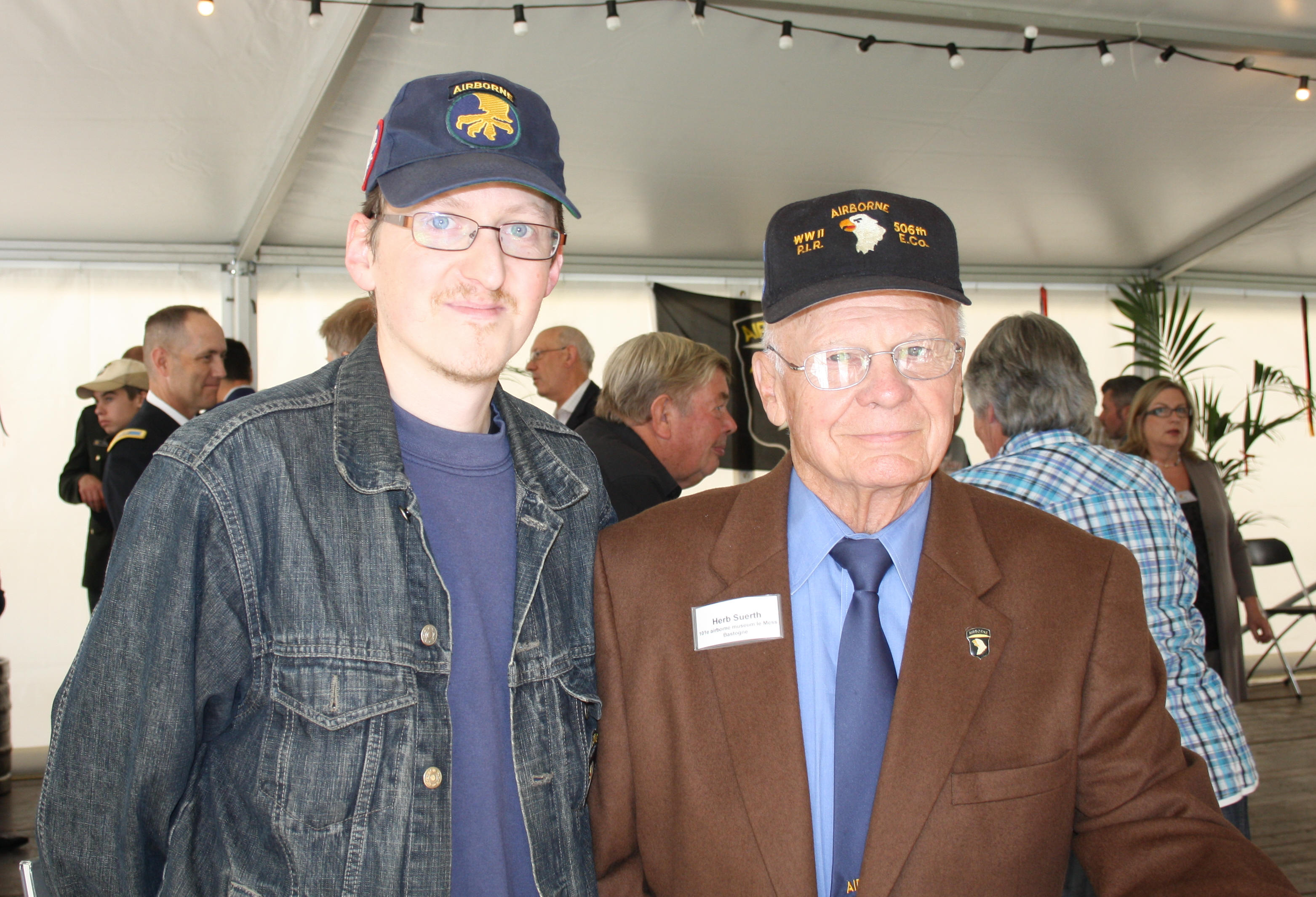
Erbh et moi, le 25 septembre 2011 - Bastogne.
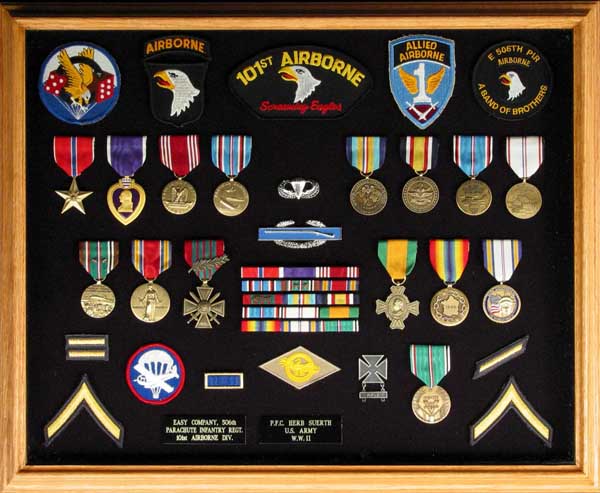
Les Décorations d'Herb Suerth.